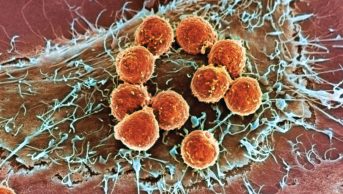The European Medicines Agency has recommended granting a marketing authorisation for new melanoma treatment nivolumab (Opdivo; Bristol-Myers Squibb), a monoclonal antibody that blocks a receptor called “programmed death-1” or PD-1.
Nivolumab is the first anticancer agent selectively targeting PD-1 to be recommended for approval in the EU. It works by activating the immune system to kill melanoma cells. The product is part of a growing group of treatments known as immune checkpoint inhibitors. The approval still needs to be authorised by the European Commission.
Nivolumab is recommended as a monotherapy for adults with advanced — unresectable or metastatic — melanoma, offering hope to those with a poor prognosis.
If detected early, melanoma can often be removed by surgery and has a very good prognosis, but advanced disease has poor survival rates, with only 10–30% of patients still alive after five years.
In one randomised trial, 418 patients with advanced malignant melanoma who had not received previous treatment were given either nivolumab or standard chemotherapy (dacarbazine). After 12 months, the survival rate for those on nivolumab was much higher than those on dacarbazine (73% compared with 42%), according to the EMA.
A second study randomised 405 patients who had received previous treatment for their melanoma to receive nivolumab or chemotherapy (either dacarbazine or carboplatin and paclitaxel). It found that a greater proportion of patients responded to nivolumab compared with chemotherapy (31.7% compared with 10.6%). There is a follow-up plan to monitor the product’s safety and efficacy.
The US Food and Drug Administration (FDA) approved nivolumab for previously treated unresectable or metastatic melanoma in December 2014. In March 2015, the FDA approved an add-on indication for the treatment of patients with metastatic squamous non-small cell lung cancer (NSCLC) with progression on or after platinum-based chemotherapy.


